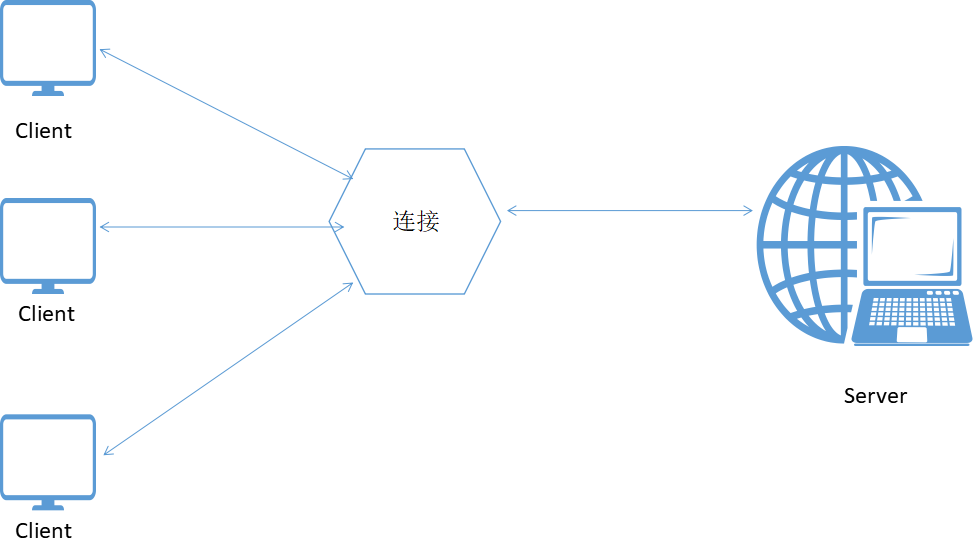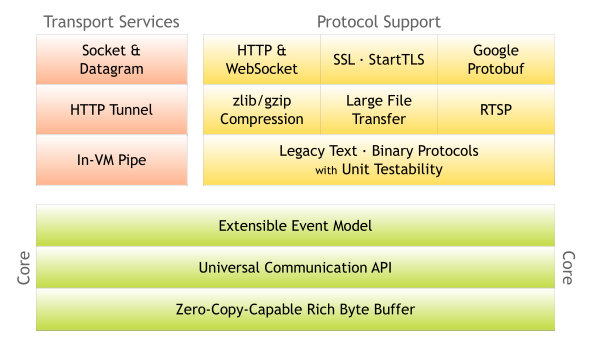Netty入门
1.Netty介绍
(1)百度百科介绍:
Netty是由JBOSS提供的一个java开源框架。Netty提供异步的、事件驱动的网络应用程序框架和工具,用以快速开发高性能、高可靠性的网络服务器和客户端程序。
也就是说,Netty 是一个基于NIO的客户、服务器端编程框架,使用Netty 可以确保你快速和简单的开发出一个网络应用,例如实现了某种协议的客户、服务端应用。Netty相当于简化和流线化了网络应用的编程开发过程,例如:基于TCP和UDP的socket服务开发。
“快速”和“简单”并不用产生维护性或性能上的问题。Netty 是一个吸收了多种协议(包括FTP、SMTP、HTTP等各种二进制文本协议)的实现经验,并经过相当精心设计的项目。最终,Netty 成功的找到了一种方式,在保证易于开发的同时还保证了其应用的性能,稳定性和伸缩性。
(2)官网介绍:netty.io
Netty is an asynchronous event-driven network application framework
for rapid development of maintainable high performance protocol servers & clients.
(3)参考资料:
- 参考书籍:Netty实战(Norman Maurer & Marvin Allen Wolfthal)
- 参考官方文档:https://netty.io/wiki/user-guide.html
- 参考网址:https://ifeve.com/tag/netty/
2.程序功能概述

客户端向服务器发送HelloNetty-Server!服务器向客户端返回Hello Netty-Client!
3.程序实现
-
服务端ChannelHandler
package com.xm.netty; import io.netty.buffer.ByteBuf; import io.netty.buffer.Unpooled; import io.netty.channel.ChannelFutureListener; import io.netty.channel.ChannelHandlerContext; import io.netty.channel.ChannelInboundHandlerAdapter; import io.netty.util.CharsetUtil; public class ServerHandler extends ChannelInboundHandlerAdapter { @Override public void channelRead(ChannelHandlerContext ctx, Object msg) throws Exception { ByteBuf in = (ByteBuf) msg; System.out.println("服务器接收:"+in.toString(CharsetUtil.UTF_8)); in.clear(); String str = "Hello Netty-Client!"; in.writeBytes(str.getBytes()); ctx.write(in); } @Override public void channelReadComplete(ChannelHandlerContext ctx) throws Exception { ctx.writeAndFlush(Unpooled.EMPTY_BUFFER).addListener(ChannelFutureListener.CLOSE); } @Override public void exceptionCaught(ChannelHandlerContext ctx, Throwable cause) throws Exception { cause.printStackTrace(); ctx.close(); } } -
服务端Server
package com.xm.netty; import java.net.InetSocketAddress; import io.netty.bootstrap.ServerBootstrap; import io.netty.channel.Channel; import io.netty.channel.ChannelFuture; import io.netty.channel.ChannelInitializer; import io.netty.channel.EventLoopGroup; import io.netty.channel.nio.NioEventLoopGroup; import io.netty.channel.socket.nio.NioServerSocketChannel; public class Server { private final int port; public Server(int port) { this.port = port; } public static void main(String[] args) { int port = 8989; try { new Server(port).start(); } catch (InterruptedException e) { // TODO Auto-generated catch block e.printStackTrace(); } } private void start() throws InterruptedException { final ServerHandler serverHandler = new ServerHandler(); EventLoopGroup group = new NioEventLoopGroup(); try { ServerBootstrap bootstrap = new ServerBootstrap(); bootstrap .group(group) .channel(NioServerSocketChannel.class) .localAddress(new InetSocketAddress( port)) .childHandler(new ChannelInitializer() { @Override protected void initChannel(Channel ch) throws Exception { ch.pipeline().addLast(serverHandler); } }); ChannelFuture future = bootstrap.bind().sync(); future.channel().closeFuture().sync(); } finally { group.shutdownGracefully().sync(); } } } -
客户端ChannelHandler
package com.xm.netty; import io.netty.buffer.ByteBuf; import io.netty.buffer.Unpooled; import io.netty.channel.ChannelHandlerContext; import io.netty.channel.SimpleChannelInboundHandler; import io.netty.util.CharsetUtil; public class ClientHandler extends SimpleChannelInboundHandler<ByteBuf> { @Override public void channelActive(ChannelHandlerContext ctx) throws Exception { ctx.writeAndFlush(Unpooled.copiedBuffer("Hello Netty-Server!",CharsetUtil.UTF_8)); } @Override protected void channelRead0(ChannelHandlerContext ctx, ByteBuf msg) throws Exception { System.out.println("客户端接收到消息:"+msg.toString(CharsetUtil.UTF_8)); } @Override public void exceptionCaught(ChannelHandlerContext ctx, Throwable cause) throws Exception { cause.printStackTrace(); ctx.close(); } } -
客户端Client
package com.xm.netty; import io.netty.bootstrap.Bootstrap; import io.netty.channel.ChannelFuture; import io.netty.channel.ChannelInitializer; import io.netty.channel.EventLoopGroup; import io.netty.channel.nio.NioEventLoopGroup; import io.netty.channel.socket.SocketChannel; import io.netty.channel.socket.nio.NioSocketChannel; public class Client { private final int port; private final String host; public Client(int port, String host) { this.port = port; this.host = host; } public static void main(String[] args) { String host = "127.0.0.1"; int port = 8989; try { new Client(port, host).start(); } catch (InterruptedException e) { // TODO Auto-generated catch block e.printStackTrace(); } } private void start() throws InterruptedException { EventLoopGroup group = new NioEventLoopGroup(); try { Bootstrap bootstrap = new Bootstrap(); bootstrap .group(group) .channel(NioSocketChannel.class) .remoteAddress(host, port) .handler(new ChannelInitializer<SocketChannel>() { @Override protected void initChannel(SocketChannel ch) throws Exception { ch.pipeline().addLast(new ClientHandler()); } }); ChannelFuture future = bootstrap.connect().sync(); future.channel().closeFuture().sync(); } finally { group.shutdownGracefully().sync(); } } } -
导入依赖
<project xmlns="http://maven.apache.org/POM/4.0.0" xmlns:xsi="http://www.w3.org/2001/XMLSchema-instance" xsi:schemaLocation="http://maven.apache.org/POM/4.0.0 http://maven.apache.org/xsd/maven-4.0.0.xsd"> <modelVersion>4.0.0</modelVersion> <groupId>com.xm</groupId> <artifactId>netty</artifactId> <version>0.0.1-SNAPSHOT</version> <dependencies> <dependency> <groupId>io.netty</groupId> <artifactId>netty-all</artifactId> <version>4.1.16.Final</version> </dependency> </dependencies> </project>
4.运行结果:
-
服务端:
服务器接收:Hello Netty-Server!
-
客户端:
客户端接收到消息:Hello Netty-Client!




